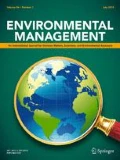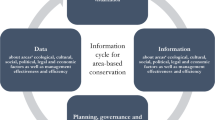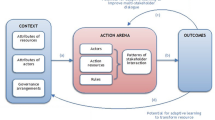Abstract
Governance gaps at both the federal and state level increasingly necessitate local action and remain a key driver of community-based solutions. A localist paradigm—encompassing models such as community-based management, citizen science, and cooperative research—offers a promising approach for bridging governance gaps by engaging citizens, co-producing knowledge, fostering trust, and developing innovative solutions to address complex conservation challenges. Yet, despite notable successes, significant barriers constrain widespread implementation of localist approaches. This is particularly evident in natural resource-dependent communities. Rural communities are increasingly faced with a range of conservation challenges related to rapid climate and land-use changes but often they lack the capacity to support locally based initiatives to better anticipate, plan for, and mitigate these changes. We examined four diverse conservation cases based on localist approaches in Maine, USA, to bring to the fore key factors that influence outcomes in different social-ecological contexts. We compared cases along three frequently discussed dimensions—governance systems, social adaptive capacities, and technology and data characteristics and found that localist outcomes vary widely depending on key metrics within each of these dimensions. There is no single way to advance localism, but we offer multiple ways to incorporate a community-based perspective into management. This synthesis of data from our collective participatory research projects provides guidance to maximize the potential of localist conservation approaches in complex social and biophysical arenas.



Similar content being viewed by others
References
Adger WN (2000) Social and ecological resilience: are they related? Prog Hum Geogr 24:347–364
Agrawal A, Gibson CC (1999) Enchantment and disenchantment: the role of community in natural resource conservation. World Dev 27:629–649
Alexander SM, Andrachuk M, Armitage DA (2016) Navigating governance networks for community-based conservation. Front Ecol Environ 14(3):155–164
Allen KM (2006) Community-based disaster preparedness and climate adaptation: local capacity-building in the Phillipines. Disasters 30:81–101
Armitage D (2005) Adaptive capacity and community-based natural resource management. Environ Manag 35:703–715
Armitage DR, Plummer R, Berkes F, Arthur RI, Charles AT, Davidson-Hunt IJ, Diduck AP, Doubleday NC, Johnson DS, Marschke M, McConney P, Pinkerton EW, Wollenberg EK (2009) Adaptive co-management for social-ecological complexity. Front Ecol Environ 7(2):95–102. https://doi.org/10.1890/070089
Beal BF, Nault M, Annis H, Thayer P, Leighton H, Ellis B (2016) Comparative, large-scale field trials along the Maine coast to assess management options to enhance populations of the commercially important softshell clam, Mya arenaria L. J Shellfish Res 35(4):1–17
Berkes F, Folke C (eds) (1998) Linking social and ecological systems: management practices and social mechanisms for building resilience. Cambridge University Press, Cambridge
Bieluch KH, Alewife Harvesters of Maine Board of Directors (2014) Planning a future for Maine’s alewife fisheries: Outreach and interviews with local stakeholders. Technical Report
Bieluch KH, Enterline C, Pierce J (2014) River herring fisheries: significant industries. Maine Municipal Association, Maine Townsman Augusta, ME
Bieluch KH, Smith J, Willis TV (2015) Coordinating volunteer river herring monitoring programs in Maine and Massachusetts: operations, strategies and recommendations. Technical report. http://www.nfwf.org/archive/Documents/coordinating-volunteer-river-herring-monitoring-programs-me-ma.pdf
Bieluch KH, Willis T, Smith J, Wilson KA (2017) The complexities of counting fish: engaging citizen scientists in fish monitoring. Maine Policy Rev 26(2):9–18. http://digitalcommons.library.umaine.edu/mpr/vol26/iss2/4
Bieluch KH (2018) Leadership as partnership. Maine Policy Rev 27:134–35. https://digitalcommons.library.umaine.edu/mpr/vol27/iss1/11
Brick P, Snow D, Van De Wetering S (2001) Across the great divide: explorations in collaborative conservation and the American West. Island Press, Washington, DC
Calhoun AJK, Klemens MW (2002) Best development practices for pool-breeding amphibians in commercial and residential developments. Wildlife Conservation Society Technical Paper #5, Rye, New York
Calhoun AJK, Walls TE, McCollough M, Stockwell SS (2003) Developing conservation strategies for vernal pools: a Maine case study. Wetlands 23:70–81
Calhoun AJK, deMaynadier PG (2004) Forestry habitat management guidelines for vernal pool wildlife in Maine. Wildlife Conservation Society Technical Paper #6, Rye, New York
Calhoun AJK, Jansujwicz JS, Bell KP, Hunter, ML Jr (2014) Improving management of small natural features on private lands by negotiating the science-policy boundary for Maine vernal pools. Proc Natl AcadSci USA 111(30):11002–11006. https://doi.org/10.1073/pnas.1323606111
Chen LC, Liu YC, Chan KC (2006) Integrated community-based disaster management program in Taiwan: a case study of Shang—a village. Nat Hazard 37:209–223
Cournane J, Glass C (2014) Summary of Maine alewife harvester focus groups, January 2013. Technical Report. Retrieved from: https://studylib.net/doc/5206770/summary-of-alewife-harvesters-focus-groups
Creed IF, Lane CR, Serran JN, Alexander LC, Basu NB, Calhoun AJK, Christensen JR, Cohen MJ, Craft C, D’Amico E, DeKeyser E, Fowler L, Golden HE, Jawitz JW, Kalla P, Kirkman LK, Lang M, Leibowitz SG, Lewis DB, Marton J, McLaughlin DL, Raanan-Kiperwas H, Rains MC, Smith L (2017) Enhancing protection for vulnerable waters. Nat Geosci 10(11):809–815
Dinnie E, Fischer A (2019) The trouble with community: how “sense of community” influences participation in formal, community-led organisations and rural governance. Sociol Rural. https://doi.org/10.1111/soru.12273
Draper AK, Hewitt G, Rifkin S (2010) Chasing the dragon: developing indicators for the assessment of community participation in health programmes. Soc Sci Med 71(6):1102–1109
Dumaru P (2010) Community-based adaptation: enhancing community adaptive capacity in Druadrua Island, Fiji. WIREs Clim Change 1:751–763
Evans KS, Athearn K, Chen X, Bell KP, Johnson T (2016) Measuring the impact of pollution closures on commercial shellfish harvest: the case of soft-shell clams in Machias Bay, Maine. Ocean Coast Manag 130:196–204
Featherstone DA, Ince D, Mackinnon D et al. (2012) Progressive localism and the construction of political alternatives. Trans Inst Br Geogr 37:177–182
Fenge T (1997) Ecological change in the Hudson Bay bioregion: a traditional ecological knowledge perspective. North Perspect 25(1):2–3
Folke C, Colding J, Berkes F (2003) Synthesis: building resilience and adaptive capacity in social-ecological systems. In: Berkes F, Colding J, Folke C (eds) Navigating social-ecological systems: building resilience for complexity and change. Cambridge University Press, UK
Gadgil M, Olsson P, Berkes F, Folke C (2003) Exploring the role of local ecological knowledge in ecosystem management: three case studies. In: Berkes F, Colding J, Folke C (eds) Navigating social-ecological systems: building resilience for complexity and change. Cambridge University Press, UK
Gelcich S, Edwards-Jones G, Kaiser MJ, Castilla JC (2006) Co-management policy can reduce resilience in traditionally managed marine ecosystems. Ecosystems 9(6):951–966. https://doi.org/10.1007/s10021-005-0007-8
Gruber JS (2010) Key principles of community-based natural resource management: a synthesis and interpretation of identified effective approaches for managing the commons. Environ Manag 45:52–66
Hall CJ, Jordaan A, Frisk MG (2011) The historic influence of dams on diadromous fish habitat with a focus on river herring and hydrologic longitudinal connectivity. Landsc Ecol 26(1):95–107
Hanna SS (2000) Managing for human and ecological context in the Maine soft shell clam fishery. In: Berkes F, Folke C (eds) Linking social and ecological systems: management practices and social mechanisms for building resilience, 2nd ed. Cambridge University Press, Cambridge
Hart DD, Silka L (2020) Rebuilding the ivory tower: a bottom-up experiment in aligning research with societal needs. Issues Sci Technol 36(3):79–85.
Hayden A, Steinman M, Gorich R (2019) Downeast fisheries partnership 2019. Up and up: river herring in Eastern Maine. Technical Report. Downeast Fisheries Partnership. https://www.manomet.org/wp-content/uploads/2019/05/DFP_RiverHerringReport-web.pdf Accessed 17 Apr 2020
Holling CS (ed) (1978) Adaptive environmental assessment and management. Wiley, London
Hybšová A, Leppink J (2015) The subject of statistics in natural science curricula: a case study. J Effic Responsib Educ Sci 8:8–14. https://doi.org/10.7160/eriesj.2015.080102
Jansujwicz JS, Calhoun AJK (2010) Protecting natural resources on private lands: the role of collaboration in land-use planning. In: Trombulak S, Baldwin R (eds) Landscape-scale conservation planning. Springer-Verlag, New York, NY, p 205–233
Jansujwicz JS, Calhoun AJK, Lilieholm RJ (2013a) The Maine Vernal Pool Mapping and Assessment Program: engaging municipal officials and private landowners in community-based citizen science. Environ Manag 52(6):1369–1385. https://doi.org/10.1007/s00267-013-0168-8
Jansujwicz JS, Calhoun AJK, Leahy JE, Lilieholm RJ (2013b) Using mixed methods to develop a frame-based private landowner typology. Soc Nat Resour 26(8):945–961. https://doi.org/10.1080/08941920.2012.729294
Jansujwicz JS, Calhoun AJK (2017) Community-based strategies for strengthening science and influencing policy: vernal pool initiatives in Maine. Maine Policy Rev 26(2):33–42
Jansujwicz JS, Johnson TR (2015a) The Maine Tidal Power Initiative: transdisciplinary sustainability science research for the responsible development of tidal power. Sustain Sci 10:75–86. https://doi.org/10.1007/s11625-014-0263-7
Jansujwicz JS, Johnson TR (2015b) Understanding and informing permitting decisions for tidal energy development using an adaptive management framework. Estuaries Coasts 38(Supp 1):S253–S265. https://doi.org/10.1007/s12237-013-9678-0
Johnson TR, Jansujwicz JS, Zydlewski Z (2015) Tidal power development in Maine: stakeholder identification and perceptions of engagement. Estuaries Coasts 38(Supp 1):S266–S278. https://doi.org/10.1007/s12237-013-9703-3
Kellert S, Mehta J, Ebbin S, Lichtenfeld L (2010) Community natural resource management: promise, rhetoric and reality. Soc Nat Resour Manag 13:705–715
Konstantinova E, Brunina L, Persevica A, Honavko I (2017) Assessment of ecosystems and ecosystem services for sustainable land use management in Latvia. Eng Rural Dev Jelgava 24–26.05. https://doi.org/10.22616/ERDev2017.16.N245
Koontz TM, Steelman TA, Carmin J, Korfmacher KS, Moseley C, Thomas CW (2004) Collaborative environmental management: what roles for government? Resources for the Future, Washington, DC
Lebel L, Anderies JM, Campbell B, Folke C, Hatfield-Dodds S, Hughes TP, Wilson J (2006) Governance and the capacity to manage resilience in regional social-ecological systems Ecol Soc 11(1):19. http://www.ecologyandsociety.org/vol11/iss1/art19/
Levesque V, Calhoun AJK, Hertz, E (2019) Vernal pool conservation: Innovative approaches to using and enhancing existing policy tools. Case Stud Environ. https://doi.org/10.1525/cse.2018.001636
Levesque V, Calhoun AJK, Bell KP (2016) Turning contention into collaboration: engaging power, trust, and learning in collaborative networks. Soc Nat Resour 9(2):1–16
Madanipour A, Davoudi S (eds) (2015) Reconsidering localism. Routledge, New York/London
Mahaney WS, Klemens MW (2008) Vernal pool conservation policy: the federal, state, and local context. In: Calhoun AJK, de Maynadier PG (eds) Science and conservation of vernal pools in Northeastern North America. CRC, Boca Raton, FL, pp 193–212
Marafino G (unpublished data) Integrating local ecology and human dimensions to understand a tidally dynamic ecosystem in Downeast Maine. Prepared for Master’s Thesis, University of Maine, Orono (2020)
Mason RJ (2008) Collaborative land use management: the quieter revolution in place based planning. Rowman & Littlefield Publishers, Inc., New York, NY
McGinnis MV, Woolley J, Gamman J (1999) Bioregional conflict resolution: rebuilding community watershed planning and organizing. Environ Manag 24(1):1–12
McGreavy B, Ranco D, Daigle J, Greenlaw S, Altvater N, Quiring T, Michelle N, Paul J, Binette M, Benson B, Sutton T, Hart D (under review) Science in indigenous homelands: addressing power and justice in sustainability science from/with/in the Penobscot River. Sustain Sci
McGreavy B, Calhoun AJK, Jansujwicz J, Levesque V (2016) Citizen science and natural resource governance: program design for vernal pool policy innovation. Ecol Soc 21(2):48. https://doi.org/10.5751/ES-08437-210248
McGreavy B, Hart D (2017) Sustainability science and climate change communication. In: Nisbet M (Ed.) Oxford encyclopedia of climate change communication. Oxford University Press, New York, NY. https://doi.org/10.1093/acrefore/9780190228620.013.563
McGreavy B, Randall S, Quiring T, Hathaway C, Hillyer G (2018) Enhancing adaptive capacities in coastal communities through engaged communication research: Insights from a statewide study of shellfish co-management. Ocean Coast Manag 163(1):240–253. https://doi.org/10.1016/j.ocecoaman.2018.06.016
MEDMR (2017) 2012–2016 landings by species report. Maine Department of Marine Resources, Augusta. http://www.maine.gov/dmr/commercial-fishing/landings/documents/12-16LandingsBySpeciesWithBonus.Table.pdf
NOAA (2009) Species of concern: NOAA National Marine Fisheries Service: river herring. National Oceanic and Atmospheric Administration. https://www.nrc.gov/docs/ML1004/ML100481337.pdf
Oscarson D, Calhoun AJK (2007) Developing vernal pool conservation plans at the local level using citizen scientists. Wetlands 27:80–95
Ostrom E (1990) Governing the commons: the evolution of institutions for collective action. Cambridge University Press, Cambridge
Patrick DA, Harper E, Hunter ML, Calhoun AJK (2008) Terrestrial habitat selection and strong density-dependent mortality in recently metamorphosed amphibians. Ecology 89:2563–2574
Pearce L (2003) Disaster management and community planning, and public participation: how to achieve sustainable hazard mitigation. Nat Hazard 28:211–228
Pinkerton E (1989) Cooperative management of local fisheries: new directions for improved management and community development. University of British Columbia Press, Vancouver
Plummer R, Dzyundzyak A, Baird J, Bodin Ö, Armitage D, Schultz L (2017) How do environmental governance processes shape evaluation of outcomes by stakeholders? A causal pathways approach. PLoS ONE 12(9):e0185375. https://doi.org/10.1371/journal.pone.0185375
Pollack RM, Whitelaw GS (2005) Community-based monitoring in support of local sustainability. Local Environ 10(3):211–228. https://doi.org/10.1080/13549830500075438
Pomeroy RS, Berkes F (1997) Two to tango: the role of governance in fisheries co-management. Mar Policy 21(5):465–480
Sabatier PA, Focht W, Lubell M, Trachtenberg Z, Vedlitz A, Matlock M (2005) Swimming upstream: collaborative approaches to watershed management. MIT Press, Cambridge, MA
Smith J, Bieluch KH, Willis TV (2015) State, regional, and federal managers’ perspectives on citizen science programs: data use, data needs, and management decisions. Technical report. http://www.nfwf.org/archive/Documents/state-regional-federal-managers-perspectives-citizen-science-programs.pdf
Stern MJ, Coleman KJ (2015) The multidimensionality of trust: applications in collaborative natural resource management. Soc Nat Resour 28(2):117–132. https://doi.org/10.1080/08941920.2014.945062
Taylor M (2007) Community participation in the real world: opportunities and pitfalls in new governance spaces. Urban Studies 44:297–317
Tengo M, Hammer M (2003) Management practices for building adaptive capacity: a case from northern Tanzania. In: Berkes F, Colding J, Folke C (eds) Navigating social-ecological systems: building resilience for complexity and change. Cambridge University Press, UK
Weber EP (2000) A new vanguard for the environment: grass-roots ecosystem management as a new environmental movement. Soc Nat Resour 13:237–259
Wondolleck JM, Yaffee SL (2000) Making collaboration work: lessons from innovation in natural resource management. Island Press, Washington, DC
Wondolleck JM, Yaffee SL (2017) Marine ecosystem-based management 209 in practice: different pathways, common lessons. https://doi.org/10.5822/978-1-61091-800-8_9
Yin RK (2003) Case study research design and methods. Sage Publications, Thousand Oaks, CA
Young OR (1992) The effectiveness of international institutions: hard cases and critical variables. In: Rosenau JN, Czempiel EO (eds) Governance without government: order and change in world politics. Cambridge University Press, UK
Young OR (2010) Institutional dynamics: resilience, vulnerability and adaptation in environmental resource regimes. Glob Environ Change 20:378–385
Acknowledgements
Support for this research was provided by the Senator George J. Mitchell Center for Sustainability Solutions at the University of Maine. This material is based upon the work supported by the National Science Foundation under Grant No. 1828466. This project was supported by the USDA National Institute of Food and Agriculture, Hatch (or McIntire-Stennis, Animal Health, etc.) Project number ME0-5501288 through the Maine Agricultural & Forest Experiment Station. Maine Agricultural and Forest Experiment Publication Number 3785.
Author information
Authors and Affiliations
Corresponding author
Ethics declarations
Conflict of Interest
The authors declare that they have no conflict of interest.
Additional information
Publisher’s note Springer Nature remains neutral with regard to jurisdictional claims in published maps and institutional affiliations.
Rights and permissions
About this article
Cite this article
Jansujwicz, J.S., Calhoun, A.J.K., Bieluch, K.H. et al. Localism “Reimagined”: Building a Robust Localist Paradigm for Overcoming Emerging Conservation Challenges. Environmental Management 67, 91–108 (2021). https://doi.org/10.1007/s00267-020-01392-4
Received:
Accepted:
Published:
Issue Date:
DOI: https://doi.org/10.1007/s00267-020-01392-4




